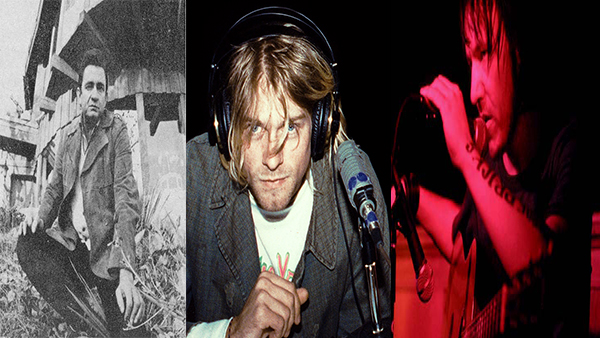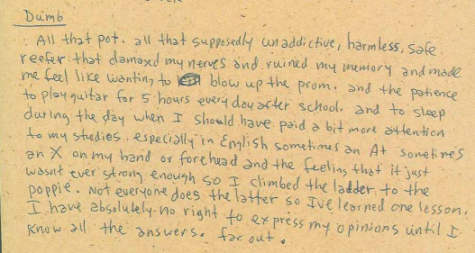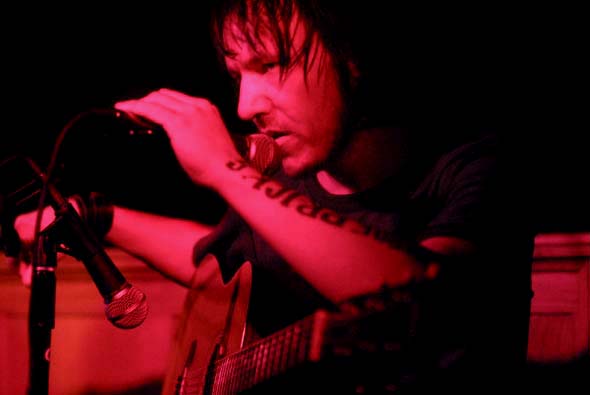Drug References in Music

December 14, 2020
Trigger Warning:
This article contains sensitive material about substance abuse and/or suicide which may be triggering.
When we think of what music genre includes the most drug references, most would probably think of hip hop, but we could not be more wrong. I tested this assumption by asking two students from CHS and AHS the same question, “Which music genre do you think has the most drug references?” Brittany Sanchez, a junior from CHS, and another junior from AHS, Demari Deaton, both think hip hop mentions drugs the most.
A study done by Addiction.com shows Country being the most drug-ridden genre, while hip hop comes in last for drug references.
A country singer like Johnny Cash mentions all kinds of drugs in several of his songs, and rock artists Kurt Cobain and Elliott Smith do the same by incorporating their experiences with substance abuse into their music.
Johnny Cash
The title of the song, “Cocaine Blues,” is already a clear implication of cocaine, the addictive stimulant drug. The meaning of the title “Cocaine Blues” alludes to depression. More specifically, depression after the use of the stimulant.
The song is about a character that runs away after shooting his woman down right after taking a shot of cocaine. The character eventually gets caught, admits his actions, and has to serve a life sentence in Folsom Prison, where Cash initially performed this song.
Johnny Cash was not only an artist but also an actor. When his career started to take off, his health started to diminish. He had become severely addicted to alcohol, amphetamines, and barbiturates.
When he went on tour, he would often use amphetamines to keep himself awake.
With all these things surrounding him, he was still a very creative and artistic person. His songs topped the charts like “Ring Of Fire,” reaching number one on the country charts and also top 20 on the pop charts. Having sold more than 90 million records worldwide, he is one of the best-selling artists of all time.
Nirvana

Kurt Cobain:
Lead singer, guitarist, and songwriter of Nirvana.
“Dumb,” the sixth song on their final studio album, In Utero, is written by Kurt Cobain himself. The piece includes a vague verse also allusive to marijuana: “My heart is broke, but I have some glue. Help me inhale, and mend it with you.” The word “glue” can be interpreted as both a drug or the adhesive that repairs his broken heart.
During the last years of his life, Cobain struggled with heroin addiction and would visit many therapists and doctors. He was known to have clinical depression as early as high school, and almost a year after the release of the final album, Cobain was found dead in his home from a self-inflicted gunshot wound to his head.
Kurt Cobain is unquestionably one of the most influential artists to live. You will often see people in our school wearing Nirvana merch, usually, the smiley face, whether they know who they are or not. One thing we know for sure is that Cobain revolutionized rock forever.
From Cobain’s Journal

Elliott Smith

Throughout the 90s, grunge bands that flourished like Nirvana and Soundgarden regularly made music with blaring noises, but Elliott’s music was quite the opposite; it carried a unique and soft tone with a rock background.
The song “Between the Bars” on Elliott’s third studio album, Either/Or, is often misinterpreted as a love song but is actually about alcohol. With lines like, “Drink up, baby, look at the stars. I’ll kiss you again, between the bars,” it’s understandable that people incorrectly regard it as a love song.
The entire piece is sung from the point of view of alcohol. The alcohol is talking to Elliott, comforting him, telling him that it (alcohol) can make him the person he wants to be.
Elliott struggled with substance abuse and depression. Everything he wrote about came from experience firsthand. When he finally got clean, months later, reportedly, he died stabbing himself in the chest with no signs of hesitation after an argument with his girlfriend.
After his death, many people labeled him as a “junkie, depressed, and lonely.” But he was so much more than that. Elliott is one of the greatest singer-songwriters of his time. His writing in music was significant. He played a handful of instruments, most notably the guitar, and cared about his fans.
Even though these artists are all no longer with us today, Elliott Smith’s magnificent songwriting, Cobain’s impact on rock, Cash’s creativity, and especially their enchanting music will continue to live on forever.



